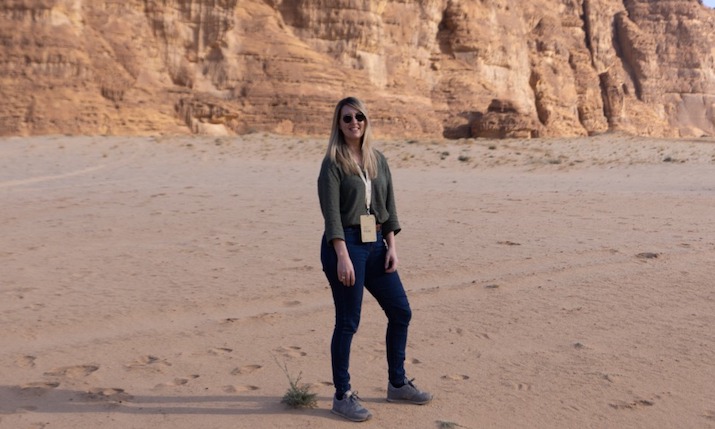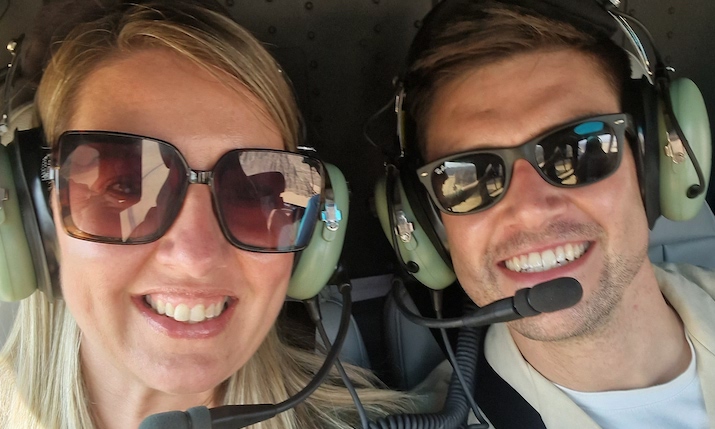The long road: Aurora’s Lara Bishop on the route to Formula E and beyond

Bishop: ‘The unpredictability of sport can be challenging at times’
“Don’t be put off by the number of men you see in positions you may want to do,” says Aurora’s director of production Lara Bishop. “There’s been a real shift in the last few years to support women and diversity behind the camera in sport. Although slow, the effects are starting to be seen; as a production company, our employees are nearly 50% male and 50% female. I’d still like to see more women in senior management positions but that will come with time as the women in the industry move up the ranks.”
“I love my job,” she continues. “I love building great relationships with clients and earning their trust over time, we always strive to deliver the best and a key part of that is listening and engaging with clients to make sure their expectations are being met, and when they aren’t then knowing that they feel comfortable enough to say so and together we work on a solution. I’m very lucky that I have a great team around me that I get to travel the world with. When we’re out on location we only have each other and when things get tough, and we can be thousands of miles from home, there’s always a hug or a drink when you need one.”
Early determination
Bishop decided that she wanted a career in TV at the age of 15. “My school actively discouraged it,” she adds. “Luckily for me, one of my teachers supported my career choice and I managed to secure work experience at BBC Radio 2 and Blue Peter. Leaving school, I chose a degree in Film and Television Production at Roehampton University, it offered a hands-on practical degree as well as the chance to study abroad and I got to do six months at the University of North Carolina Wilmington as part of my studies.
However, when she graduated Bishop struggled to get into the industry. “I had no connections, and my university didn’t prepare me for how to find work,” she says. “This was before the days of mass social media so I cold-called people and sent my CV to as many production companies as I could find addresses for. Eventually, after 10 months of trying, I managed to get a runner position washing dishes on Saturday Kitchen, it was only one day a week while I temped as a receptionist to make ends meet, but it was my foot in the door and I loved it. I was so excited to finally have an ‘in’ and I worked my socks off to show I was committed. Off the back of that, I was offered a full-time job as a runner at Capital Studios, and the rest is history.”
“There’s been a real shift in the last few years to support women and diversity behind the camera in sport. Although slow, the effects are starting to be seen”
Bishop won a promotion to become the client liaison at Capital Studios, a “great role learning all about studio production”.
“After three years at Capital I crossed over into production management,” she continues. “Initially I worked for Endemol, and then as a freelancer moved around the industry working in documentaries (Billy Connolly’s Route 66 was a highlight), reality, children’s and food (including Jamie Oliver’s Friday Night Feast and Italian Christmas show), both in the UK and internationally before coming back to studios when I started to work for Talkback.”
As a first foray into sport, Bishop took a position as the line producer for Progress Productions on the Asian games in Turkmenistan, overseeing the sports presentation for all 15 venues. “Following that I moved to North One to unit manage a huge, complicated entertainment OB, and then on to Love Productions to unit manage a large residential observational documentary. It was through the connection with North One that I was recommended to Aurora when the head of production role on the Formula E series was advertised.
“After three years of working solely on Formula E, the role of director of production came up at Aurora, I expressed my interest with Lawrence our MD and was delighted when he offered me the position.”
“Before working at Aurora, I had always been freelance and able to craft out my career progression through jobs I chose to accept,” she adds. “I was ready to push on for my next challenge but didn’t want to leave Aurora so when the role came up it was the perfect next step for me.”
Bishop has been in the role for just over a year. “In that time, I’ve learnt so much: as a company, we’re pushing the boundaries of technical innovation in sports broadcasting, so staying still is not an option for us,” she says. “I’m constantly learning, none of us know everything so it’s even more important to work as a team and make sure that we pool our knowledge to keep innovating the products we produce.
“I think the graphics on SailGP have really pushed the sport on making it far more accessible to people who don’t know the sport. For FIFA we created a daily World Cup show with creators all over the world sending us content via Greenfly. To see fan action from fans in their home countries without having to send a crew there to do it meant we got amazing first-hand content.”
She feels 2023 is already shaping up to be another great year. “There is lots in development, so watch this space for where Aurora heads next! Career-wise I want to continue to learn and take on new challenges, if I ever get complacent, I know it’s time to learn something new and push myself out of my comfort zone.”
Red flags and camaraderie
Looking back on her career, Bishop recalls many “pinch me moments”: “From wild cooking on the side of the road in the Italian Alps with Jamie Oliver, setting up the team for Billy Connolly’s Route 66 documentary, to more recently being part of the team that took Formula E to remote broadcasting,” she says. “Being on that first remote broadcast in Berlin for the season 6 finale when we had a whole crew back in Ealing was amazing.”

Bishop: ‘It’s so important to build brilliant teams, singularly you might not have the answer but collectively there will be a solution’
There have also been trials. “The unpredictability of sport can be challenging at times, for example when you get a particularly long red flag in Formula E and it has a knock on to all of the broadcast schedules,” she explains. “The time on the road can also be hard; when I first started doing the kind of travelling I do today I found it difficult to adjust to all the time zones, your health can take a hit when you are eating irregularly and not exercising as much. I’ve found if you prepare before you leave home and are disciplined when you arrive on location then you can control it. These days I have no problem with time zone shifting but that’s because I am diligent in my routines and always pack a supply of melatonin!
“It was really hard to break into the industry not knowing anyone or having any ‘ins’ but I’m glad I made it on my own as I can say that I am where I am because of me and the hard work I put in and not because my Mum’s mate gave me a job,” she continues. “Those first 10 months of trying to get into the industry when doors were repeatedly closed in my face taught me some valuable lessons: firstly to never take my job for granted, but most importantly that when things get hard there’s always a solution. On a stressful work day last year one of my friends who also works in sport said his dad, who is Scottish, told him ‘what’s for you won’t go by you’ and I believe that. If it’s meant to be it will be and if not, well learn the lesson and move on.”
But, she says, women should not be afraid to ask questions. “Don’t be afraid to say that you don’t know something, that’s the only way you’ll learn,” she adds. “I’ve heard so many women say that they are too afraid to ask if they don’t know something, but you’ll never learn if you don’t ask the question – nobody has all the answers. That’s why it’s so important to build brilliant teams, singularly you might not have the answer but collectively there will be a solution.”
She celebrates the camaraderie of teams in sports broadcasting. “When you work in live sport everyone is in the trenches with you, from the runners to the MD of the company you work for. There’s a hierarchy, of course, but it feels like when the chips are down everyone mucks in to help out,” she adds. “It’s not like that in every part of the TV industry.”
